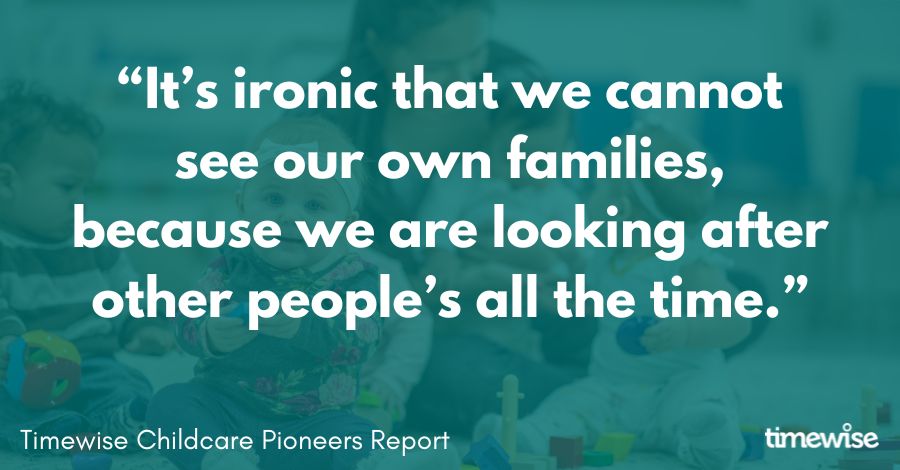

4 in 10 early years educators are leaving the sector - for good. Pay and progression are known issues. Now it’s time to start looking at working pattern, too.

By Nicola Pease, Principal Consultant, Timewise
We can all agree that any functioning society needs an excellent system of early years and childcare provision. At present, our high quality early years educators are managing to provide a great service, but many are stressed, exhausted and have little to no work-life balance. In short, it’s an early years system on the edge.
While issues around pay and progression loom large with no immediate resolution in sight, let’s look to what we can fix. Building on recent successes in other shift-based, site-based sectors such as nursing, construction and retail, Timewise launched a report following an in-depth two-year project in the early years and childcare sector. Thanks to support from JPMorganChase we were able to partner with two leading childcare providers: the Early Years Alliance and the London Early Years Foundation, and get close to childcare staff, in settings.
We analysed the industry’s challenges and assessed its potential with regards to improving staff wellbeing through changes to working patterns. Sometimes, even the smallest changes can make an enormous difference. We conducted all our research and analysis whilst keeping the experiences of children and parents front of mind. If this is going to work: it has to work for everyone.
We held a packed event in Westminster, with support from the Early Education and Childcare Coalition, to launch our subsequent report, Building the early years and childcare workforce of the future, with early years providers, policymakers and local and national government representatives. We collaborated on ideas and sharing ‘what works’ at settings across the UK. All with the experience of children and quality of education and care, front and centre of our thinking. Read on, to find out more…
The early years sector is facing a perfect storm – the expansion of 30 hours funded childcare will require an additional 35,000 staff across the UK, yet 78% of providers in a recent survey said they are already struggling to attract people to a sector that is not competitive on pay or working conditions. 62% of the workforce earn less than the living wage, with pay rates similar to roles in retail and hospitality, that are arguably less physically and emotionally demanding – and sometimes offer more flexibility in terms of what shifts and hours people can work.
There is also an increasing number of pressures on our early years educators which is driving up their workload and making the job harder. For example a growth in the demand for longer-hours provision to meet the needs of parents and (as was raised numerous times at our event), a hugely increased number of children presenting with SEND. All this notches up the pressure gauge.
The research found that nearly two-thirds of staff in group-based settings have said they do not have good work-life balance.

Part-time work across the sector has fallen in the majority of settings since 2018-19 with flexible working options generally achieved through the use of casual, agency or bank staff.
Managers recognised the potential benefits of offering flexible working but were concerned about continuity of care, maintaining staff-child ratios, meeting training standards, ensuring fairness and managing team dynamics. As one person described life in a nursery, “It’s a constant jigsaw.”
At the roundtable we heard a clear call to value those working in Early Years more highly, recognising that, “It’s not just about numbers, it’s about ensuring those who care and educate are energised, valued and motivated to do so.” There was an acknowledgement that emotional resilience is key in a workplace that demands a high level of emotional investment in children’s development and needs. And a sense that there is a need to better balance the workloads and schedules of those in such an intense working environment, to better support physical, mental and emotional wellbeing.
Increasing access and opportunity for the sector is a challenge, but through the research and numerous examples of good practice, it was proven to be possible within the operating constraints of the sector – all with the voice of the child front and centre. Innovative work practices included split-shift patterns (read Ruth’s story on page 11 of the report) and recruiting lunchtime assistants (page 18 of the report), housekeepers or tea-time assistants who enable flexibility across the wider teams. As Neil Leitch, Chief Executive of the Early Years Alliance put it, “You have to be creative. Continuity is critical but that does not mean you need always to see the same person.”
And it can also be used to enhance an organisation’s management capabilities. As June O’Sullivan OBE, the Chief Executive of LEYF said, “We need to think creatively about flexibility, in its wider context. For example, think flexibly about how you think about succession planning. It can help planning the next steps for staff or an experienced manager phase their retirement slowly, while helping a new manager to build their skills and knowledge.”
At a national level, Timewise is calling for a workforce plan that includes flexible working as a key strategic pillar. We estimate that a recruitment drive based around part-time and flexible working could attract staff to fill the equivalent of 17,850 full-time vacancies. That’s half the 35,000 shortfall the UK currently faces, to meet the expansion of 30hrs/week funded support.
Locally, we need authorities to bring networks of childcare providers together to share learnings, consider challenges and how to overcome them by exploring innovative practices such as sharing of bank staff. There was real momentum at our event around this idea – clearly they have a real ‘binding’ role to play. And for childcare providers themselves, we need to see a shift away from an individualised request-response model of flexibility towards a more pro-active whole-setting approach that encourages creativity and innovation and enables staff input into working patterns. To support this, Timewise have created a series of toolkits and resources for managers, which can be found here.
There is no magic wand with which to fix the staff and people problems that the early years sector is facing. But creating good standards of flexible working, in an industry where 98% of employees are women, many of whom have their own caring responsibilities, is not just good business sense. It’s a way to improve wellbeing and the lives of those playing the vital role of nurturing our future generations.